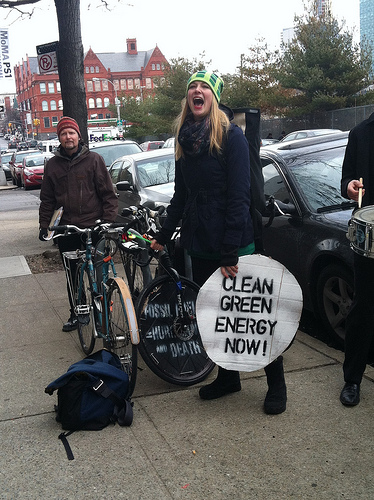
Monica Hunken, of Brooklyn, leads a chant outside of Long Island City’s DEC building calling for a statewide ban on hydraulic fracturing. Photo by Alyana Alfaro
When Eileen Hamlin first moved to her property in rural Kirkwood, N.Y. almost 30 years ago, she never imagined her 26-acre property—complete with a freshwater pond, a patch of woods and home to a family of red fowls—could become a drilling site for natural gas.
Now, as Governor Cuomo’s decision on hydraulic fracturing or fracking— looms Hamlin, 77, says she is worried for the area she and her husband, John, have called home since 1981.
“We expected to be able to live here and age in place as they say,” Hamlin said. “That apparently is not to be if the Governor allows fracking here.”
Fracking, or hydraulic fracturing, is the process of drilling and injecting fluids into the ground at high pressures in order to fracture shale rocks and release natural gas to be used as energy. While no definitive studies have been done, fracking has been linked to health and environmental concerns in many areas and the possible decision to bring fracking to New York has been especially controversial.
After over 4 years of indecision on the topic—and a moratorium in place that continues to put off the decision—if a pronouncement on fracking is not made by Cuomo and the Department of Environmental Conservation by Feb. 27, the issue will once again be up for review and will remain in contention, leaving homeowners like Hamlin, who rely on wells for drinking water, unsure of what the future holds.
“What they are trying to do here is drill in neighborhoods where there are a lot of houses,” Hamlin said. “Some engineers told us that about 10 percent of the water comes back so that water is not like golf course water that just goes in the soil, it is deep in the Earth. It is trapped. What is left down might seep out of the cracks in the shale and pollute our aquifers.”
With the upcoming government decision, the past two weeks have been a time of action for New York’s anti-fracking initiative. Rallies, such as one organized on Feb. 6 outside the Long Island City offices of the DEC, have happened all over New York State urging the government to officially reject fracking.
Dave Publow , 46, attended the DEC rally with members of his organization, Occupy the Pipeline. For Publow, the water contamination issues associated with high-pressure fracturing are what have driven him to make a “pledge of resistance” to resort to whatever means necessary to block fracking if it is put into practice in New York. The pledge, which is an initiative of the group Don’t Frack New York, has over 6,500 signatures statewide.
“If they do try to frack, we will block them,” Publow said. “We will use civil disobedience if we have to and we will not allow them to frack in this state.”
FrackingNY_1-2
Protester Monica Hunken rallies the crowd.
Vera Scroggins, 62, lives in Susquehanna County, Pa., one of the regions with the most natural gas drilling in the United States. Scroggins gives what she calls “citizen tours” of her area to show visitors what it is like to live in a region where fracking is a major industry.
“I show people from all over the world and New York in particular what it is like to live with fracking and near fracking in our neighborhoods and our countryside,” she said. “I take them out for about four hours or more and show them the different stages all the way from the drilling, to the the fracking, to the flares.”
For Scroggins, while fracking has been economically beneficial to the Pennsylvania economy, the risks are not worth the rewards.
“I see a lot of polarity, a lot of conflicts in our area,” Scroggins said. “People take sides, those who want it badly, those who don’t want it, those who are in the middle. We have a very polarized society now and community.”
For Hamlin, whose property is surrounded on three sides by land that is leased and zoned for fracking, the Governor’s decision may change her life forever.
“I cannot tolerate having well pads on two or three sides of my property,” she said. “I don’t like the idea of the animals I see on my property or the birds hurt and I don’t care to have my house made worse because Governor Cuomo decides to go through this.”
Hamlin, though she says she loves her area, said she would probably relocate if the moratorium on fracking was lifted.
“I am very saddened about it because I don’t like the idea of having to give up my home,” she said. “I really feel like we are being invaded by this industry.”


Comments
[…] Pavement Pieces […]